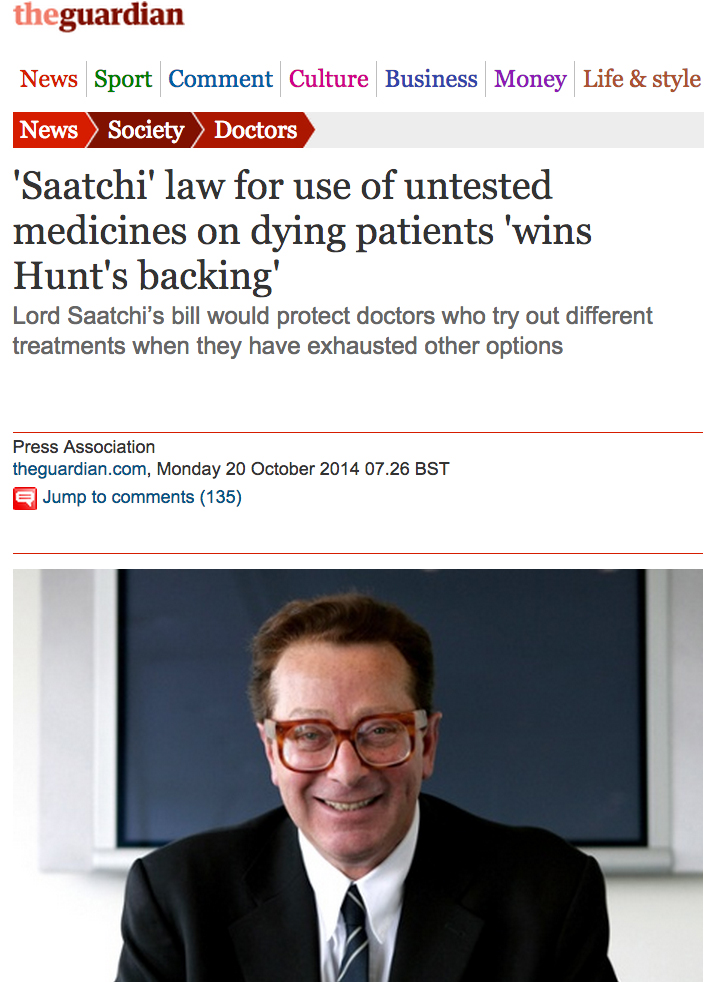By scientist Pan Pantziarka, a scientist in the UK employed by the Anticancer Fund of Belgium. Pan works on drug research as part of the Repurposing Drugs in Oncology project
Re-blogged with permission from anticancer.org.uk
Opponents of the Medical Innovation Bill (aka as the Saatchi Bill), such as Sarah Wollaston MP, have been very vocal in attacking the Bill by making a number of false claims about what the Bill will do.
One such argument is that the Bill will undermine medical progress by doing away with clinical trials, and that instead we will just have to rely on individual anecdotes that arise from doctors using innovative off-label treatments on patients. In fact Sarah Wollaston even referred to the Bill as the ‘Medical Anecdotes Bill’ in her recent speech in the House of Commons.
There are a number of points that to raise in response to this false assertion.
First, there is no intention to replace clinical trials. The Bill is about treating patients with no place left to turn – these are people who have exhausted standard therapies and for whom there are few options left to explore. If a clinical trial is open and the patient is eligible then that is the place to go if it is in the patient’s best interest. There may be cases where it is the right thing to do, just as there are cases when it will not benefit the patient who is offered the additional choice of an non-standard treatment (for example an off-label drug with evidence of clinical activity in the patient’s illness). This will be decided on a case by case basis, what it will not do is force doctors to ignore clinical trials or undermine the trials process.
We also have to keep in mind that for many rarer cancers, genetic conditions and chronic illnesses there are few clinical trials available. Just as important, even when there are clinical trials open, many patients may not be eligible because of prior treatments, confounding conditions, age or physical status restrictions and so on. What are patients supposed to do when they cannot gain access to clinical trials?
Many of the opponents of the Bill act as if there are no unmet patient needs, as if every patient has access to trials and that there is no need to consider alternatives.
Secondly, rather than leaving us with a collection of anecdotes, the Bill offers the prospect of making a huge step forward in medicine through the creation of a central database to record patient data.
This database will be hosted at Oxford University, and work is progressing with the Department of Health to work out the details. A central database which will record each patient’s details, the treatment they receive and their outcomes is actually a hugely advance in medicine.
With all of the patient data recorded we do not have a collection of anecdotes but a database that we can mine and explore and use to design clinical trials based on the signals we can glean from real patient data. It also means that non-standard treatments that work can be identified more quickly, and just as importantly those that do not work can also be identified and discouraged.
This isn’t a replacement for the clinical trial, it’s an advance on the system we now have.
The central database is really the essential piece that makes the Bill so compelling. It offers doctors looking for innovative treatments a chance to explore and learn from the experience of their colleagues.
Many of the opponents of the Bill suggest that it is not needed – they claim that doctors are already free to innovate and explore non-standard therapies. But what is not in place now is a standard process for this to occur, nor a method by which doctors can learn from each other and help to evolve the breakthroughs we so badly need.
And, finally, a central database means that patient safety will be increased. As all data has to be recorded, those unscrupulous individuals prescribing crank treatments will have to reveal their data, they will no longer be able to keep their results away from scrutiny as they now can.
About the author:
Pan Pantziarka is a scientist in the UK employed by the Anticancer Fund of Belgium. He works on drug research as part of the Repurposing Drugs in Oncology project. He is also the co-founder and chairman of the George Pantziarka TP53 Trust, the only charity in the UK dedicated to supporting families with an inherited cancer predisposition condition called Li Fraumeni Syndrome. He lost his first wife to ovarian cancer when she was 29, and his son George died in 2011 at the age of 17 from osetosarcoma.
Further reading:
→READ: Oxford University offer to host the database
→READ:Prof Walker writes – there will never be enough clinical trials




